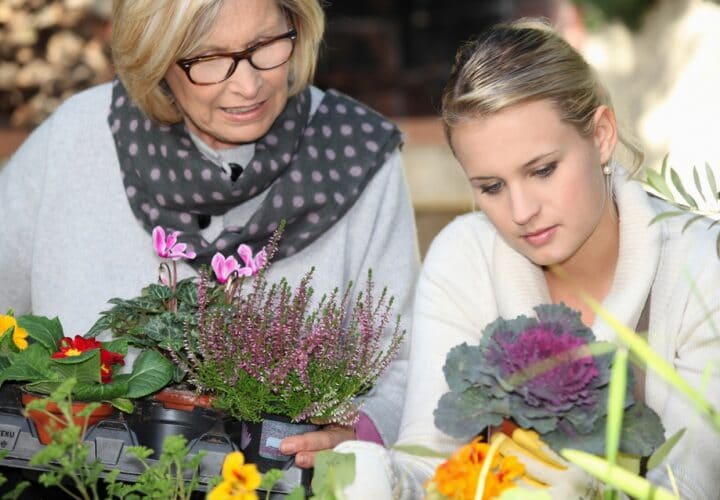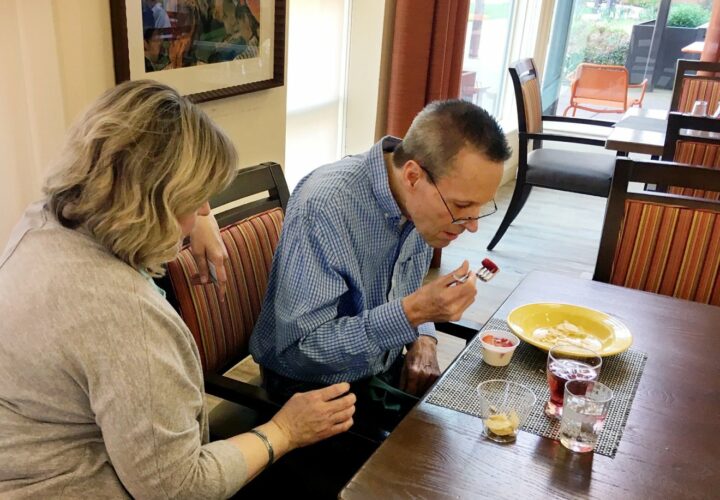Long-distance caregiving comes with many challenges. Here are some strategies to support yourself and your loved one with dementia.
Cathy Holland knows how difficult it is to have her aging parents living in another state. Four years ago, Holland’s mom, Carole, was diagnosed with Alzheimer’s disease, and while her parents continue to live in the family’s home in New Hampshire, Holland now resides in Texas with her husband and three young children.
“Coping is hard at times. I wish we lived close by, but my husband’s job and our business keeps us in Houston,” Holland said.
Although her sister lives with their parents to help care for them, and Holland returns home every three months, she admitted it’s hard to shake the feelings of sadness and guilt that come from living several states away.
“I’ve had the conversation with my parents many times about moving here but they understandably want to stay where they’ve lived all their lives,” Holland said. “There are many nights I’ve cried myself to sleep.”
When you think about Alzheimer’s, you think it’s just forgetting things and people, but there is so much more to it than that.
Distance may prevent adult children and other family members from seeing their loved one on a daily basis, but there are still a number of ways long-distance caregivers can ensure their family member is well cared for, while also getting the support they need as a caregiver.
Lori Nisson, a licensed clinical social worker and family and community services director at Banner Alzheimer’s Institute and Banner Sun Health Research Institute in Phoenix, Ariz., said she often recommends that caregivers first become knowledgeable about the different stages of Alzheimer’s to help them prepare for the future and ascertain what type of care their loved one might need.
“We have online recorded sessions available on topics such as how to pay for dementia care, and planning ahead with an Alzheimer’s diagnosis,” Nisson said. “Learning more about Alzheimer’s can help family members better understand the disease and also advocate on their loved one’s behalf.”
Holland admitted she didn’t realize how complex of a disease Alzheimer’s was before her mom’s diagnosis.
“When you think about Alzheimer’s, you think it’s just forgetting things and people, but there is so much more to it than that,” Holland said. “It affects their eating, sleeping, personality, reflexes, ability to talk, walk … basically every aspect of their lives.”
Nisson said it’s not uncommon for family members living in another state to ask their loved one’s physician if they can participate by speaker phone if they are unable to be at their loved one’s medical appointment.
“Many physician groups are also adding a social worker to their team who can serve as a liaison between the patient’s family and the care team,” Nisson said.
Some families have also found assistance hiring an Alzheimer’s care manager. These professionals (usually nurses or social workers) can help families assess the patient’s condition and lifestyle and available resources to determine whether their loved one might be better off living at home with a caregiver or if they need round-the-clock medical care at a skilled nursing facility.
Some families hire Alzheimer’s care managers on a short-term basis to develop a care plan and identify local resources that can help families. Others hire these eldercare experts for the long-term, having them accompany patients to their doctor’s appointments and overseeing paid caregivers. To find an Alzheimer’s care manager in a specific area, visit Alzheimers.net, or the U.S. Department of Health and Human Services website.
Making the Most of Your Time Together
Although Holland can’t visit her mother as frequently as she’d like to, she does call her regularly on the phone.
“As my mom’s condition has progressed, conversations have become difficult for her. But I know she likes it when I call, and I like to hear her voice,” Holland said.
There’s a myth that people with dementia are just a shell of the person they once were. While it’s true that a loved one with Alzheimer’s is not the same person that you knew before the disease, they’re still a human that craves connection.
Nisson agreed that it’s important for families to stay connected when a loved one has dementia and said the contact is important for both the patient and their adult child.
“There’s a myth that people with dementia are just a shell of the person they once were,” Nisson said. “While it’s true that a loved one with Alzheimer’s is not the same person that you knew before the disease, they’re still a human that craves connection.”
Nisson encourages family members to use senses such as touch (offering a warm hug, holding their hand) and to keep conversation in the moment, when visiting with a loved one with dementia.
“In the late stages of Alzheimer’s, sensory stimulation can help those with Alzheimer’s to communicate,” Nisson said. “Activities such as looking through old family photographs and reminiscing or listening to some of their favorite music can reduce a patient’s depression and anxiety and help them feel calmer.”
Nisson said long-distance caregivers can also offer respite to those caring for a dementia patient full-time.
“Ask what you can do while you’re visiting,” Nisson said. “Maybe it’s allowing the primary caregiver some much-needed time for self-care or taking your loved one out for a meal or to a church service.”
Taking Care of the Caregiver
Whether a caregiver is taking on the daily responsibilities of caring for a loved one or helping to care from afar, Nisson emphasized the importance of self-care.
“I’ve joined some Facebook groups for families who have a loved one with Alzheimer’s,” Holland said. “They are very informative and supportive. So many other families are dealing with the same issues and struggles.”
Nisson said it’s important for family caregivers to have a support system in place, whether in-person or online. (A full list of support groups can be found at https://www.alz.org/help-support/community/support-groups).
“Being a caregiver can be very isolating,” Nisson said. “It’s important to take care of your own health and wellbeing and to also remind yourself that you’re doing a good job.”




Thank you very much for this article! You are sharing a lot of important issues regarding being a caregiver.
The statement “While it’s true that a loved one with Alzheimer’s is not the same person that you knew before the disease,” is not true!!!!
Beneath the dementia, we are still the same person we always were. We have the same needs and wants, the same likes and dislikes, the same struggles and strengths. the problem is that those outside the disease often only see it not us.
When you see “they’re still a human that craves connection” displayed our true self is shining through.
If you wondering who I am, I was recently diagnosed with a genetic form of early onset FTD. My mother is a full-time carer of my father who has this disease at a much later stage. I am a supporter of her in that care. This diagnosis has allowed me to understand what it’s like to be behind dementia and has made me a much better carer.
If you wondering who I am, I was recently diagnosed with a genetic form of early onset FTD. My mother is a full-time carer of my father who has this disease at a much later stage. I am a supporter of her in that care. This diagnosis has allowed me to understand what it’s like to be behind dementia and has made me a much better carer.